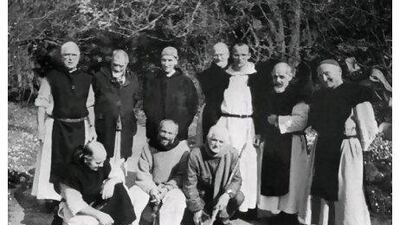PARIS // The unexpected success of a low-budget film with no special effects or hint of glamour has reawakened concern in France about the truth behind the massacre of seven Trappist monks in the Atlas mountains of Algeria 15 years ago.
Of Gods and Men has proved a big hit among French and Italian film-goers and is also making an impact in the UK, despite showing in a small number of cinemas.
Having already collected the Grand Prix at the 2010 Cannes film festival, it is now France's entry for the foreign language film category at the Oscars.
France was stunned, in the spring of 1996, by the events that inspired the film.
At a rally in the shadow of the Eiffel Tower, more than 10,000 people paid homage to the monks, members of the Order of Cistercians of the Strict Observance, whose severed heads were found by a roadside two months after their abduction from the Tibhirine monastery, 90km south of Algiers.
And although the film concentrates on the final years of the monks' lives, their relatives fervently hope 2011 will be the year their gruesome deaths are finally explained.
"There is no desire for vengeance," said Patrick Baudouin, their lawyer. "The families just want to know the truth. They want to forgive, but need to know to whom to offer forgiveness."
The kidnapping and killing of the monks, though blamed in official accounts on the revolutionary Algerian force, the Armed Islamic Group (GIA), are a source of deep controversy.
A judicial investigation that originally began in 2004 has been intensified in an attempt to establish whether they were killed by or at the behest of Algerian agents who had infiltrated the GIA, or in a bungled military operation by the Algerian army against insurgents.
The inquiry is being conducted by a prominent French antiterrorism magistrate, Marc Trévidic, who is demanding the release of official documents so far withheld by the authorities.
The monks were seized by a band of about 20 armed men on the night of March 26, leaving behind two who had been sleeping undetected in another part of the monastery.
A month later, a statement attributed to the GIA said the monks were alive and would be freed in exchange for the release of imprisoned Islamists.
Then a man presenting himself as an intermediary took a tape recording to the French consulate in which the prior of the monastery, Christian de Cherge, described the kidnappers' demands as "absolute".
Finally, on May 21, a statement again purportedly issued by the GIA announced that it had gone ahead with its threat and "slit the monks' throats".
But there has long been suspicion about the official version.
Some months after the assassinations, the French leader of Catholics in the city of Oran, who apparently believed elements of the Algerian security forces had been involved in the abduction as an initiative to discredit the GIA, was murdered.
Another theory, advanced in Passion for Algeria, a book by John Kiser published in 2006, suggested the monks were killed by accident when an Algerian army helicopter opened fire during an operation against the GIA.
The film does not show the killing of the monks but does depict the dangerous conditions on which they lived and the tensions that existed between them and the Algerian military command.
"It's not a news report. It's a drama," Xavier Beauvois, the director, said during the 2010 Cannes festival. "What interested me was the story of these men, who they were… I'd had some casts of severed heads prepared, but during the shoot decided it was ridiculous, and I thought about the families."
Despite the backdrop of tragedy, Beauvois - who favours the military-error hypothesis - wanted to portray the monks' life of simplicity, devotion to worship and the provision of food and medical care to an overwhelmingly grateful Muslim community.
When the film was released in France, it made a blockbuster-style impact at the box office, topping the ratings for four weeks and selling more than three million tickets.
Last month, aided by four and five-star reviews, it reached 11th place in the UK box office charts despite limited viewing opportunities.
In an interview with the London-based Catholic Herald newspaper, the screenwriter Etienne Comar, said the monks' peaceful coexistence with the Muslim community was part of the film's appeal.
"The story of their lives was very important for the film. I thought," he said. "The drama here, before their execution, is so much more interesting. Why had they wanted to be in there in Algeria when it was dangerous for them?"
Mr Baudouin, the Paris lawyer acting for the monks' families, said there were clues pointing to the involvement of Algerian secret services in all three stages of the affair: abduction, detention and massacre.
"They were taken by militants, yes," he said. "But what else was at play? Were they manipulated?"
Mr Baudouin says it may well be that the operation began without the intention to murder the monks, possibly with the twin aims of placing the GIA in a bad light and convincing the monks they ought to leave the country. The plan may then have "gone wrong", he said, with their accidental killing by Algerian forces.
If the words of the French president, Nicolas Sarkozy, can be taken at face value, Mr Baudouin and Mr Trévidic have a powerful ally in their search for answers. "I tell you one thing," Mr Sarkozy said last year. "I want the truth. Relations among major countries are settled on the truth and not lies."


